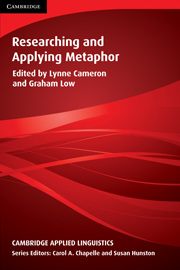Book contents
- Frontmatter
- Contents
- List of contributors
- Acknowledgements
- Conventions
- Series editors' preface
- Preface
- I KEY ISSUES IN METAPHOR RESEARCH
- II FROM THEORY TO DATA
- III ANALYSING METAPHOR IN NATURALLY OCCURRING DATA
- IV ANALYSING METAPHOR IN ELICITED DATA
- 10 “Captain of my own ship”: Metaphor and the discourse of chronic illness
- 11 “This paper thinks …”: Investigating the acceptability of the metaphor an essay is a person
- 12 When is a dead rainbow not like a dead rainbow? A context-sensitive method for investigating differences between metaphor and simile
- References
- Index
10 - “Captain of my own ship”: Metaphor and the discourse of chronic illness
Published online by Cambridge University Press: 05 October 2012
- Frontmatter
- Contents
- List of contributors
- Acknowledgements
- Conventions
- Series editors' preface
- Preface
- I KEY ISSUES IN METAPHOR RESEARCH
- II FROM THEORY TO DATA
- III ANALYSING METAPHOR IN NATURALLY OCCURRING DATA
- IV ANALYSING METAPHOR IN ELICITED DATA
- 10 “Captain of my own ship”: Metaphor and the discourse of chronic illness
- 11 “This paper thinks …”: Investigating the acceptability of the metaphor an essay is a person
- 12 When is a dead rainbow not like a dead rainbow? A context-sensitive method for investigating differences between metaphor and simile
- References
- Index
Summary
Metaphor and serious illness
The writer most commonly associated with metaphor and illness is Sontag, whose two essays (collected in one volume, 1991) examined the metaphors associated with, firstly, tuberculosis and cancer, and several years later, with AIDS. It is an irony of Sontag's endeavour that in arguing for a metaphor-free view of illness, she finds herself constantly seduced by and reverting to, the rich and potent supply of metaphoric devices that she herself employs to put forward her argument. Thus, at the start of Illness as Metaphor we are told: “Illness is the night-side of life, a more onerous citizenship. Everyone who is born holds dual citizenship, in the kingdom of the well and in the kingdom of the sick” (1991: 3). And throughout Sontag's articulate and elegant work we are reminded of the difference between the things she wants to say and the means by which she must say them. She wishes to “demythicize” disease and over and over again reiterates that “my point is that illness is not a metaphor, and that the most truthful way of regarding illness … is one most purified of, most resistant to, metaphoric thinking” (ibid.).
Sontag collates an abundant supply of metaphoric representations from various sources: cancer is a “demonic pregnancy” (1991: 14), and a “degeneration”. “In cancer the patient is ‘invaded’ by alien cells, which multiply, causing an atrophy or blockage of bodily functions” (ibid.).
- Type
- Chapter
- Information
- Researching and Applying Metaphor , pp. 203 - 220Publisher: Cambridge University PressPrint publication year: 1999
- 14
- Cited by



